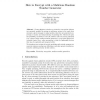19 search results - page 2 / 4 » Using biased coins as oracles |
CRYPTO
2004
Springer
13 years 10 months ago
2004
Springer
Many cryptographic primitives begin with parameter generation, which picks a primitive from a family. Such generation can use public coins (e.g., in the discrete-logarithm-based c...
FOCS
2010
IEEE
13 years 3 months ago
2010
IEEE
The Coin Problem is the following problem: a coin is given, which lands on head with probability either 1/2 + or 1/2 - . We are given the outcome of n independent tosses of this co...
FSE
2008
Springer
13 years 7 months ago
2008
Springer
Chosen-plaintext attacks on private-key encryption schemes are currently modeled by giving an adversary access to an oracle that encrypts a given message m using random coins that ...
ACISP
2007
Springer
13 years 11 months ago
2007
Springer
Abstract. Digital signatures are often proven to be secure in the random oracle model while hash functions deviate more and more from this idealization. Liskov proposed to model a ...
EUROCRYPT
1998
Springer
13 years 9 months ago
1998
Springer
Abstract. Provable security is a very nice property for cryptographic protocols. Unfortunately, in many cases, this is at the cost of a considerable loss in terms of efficiency. Mo...

